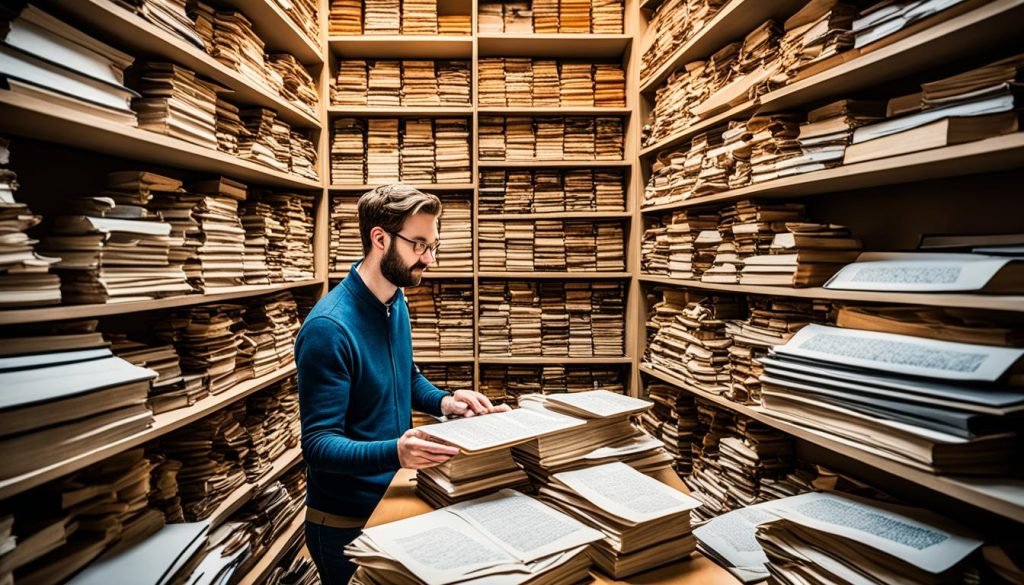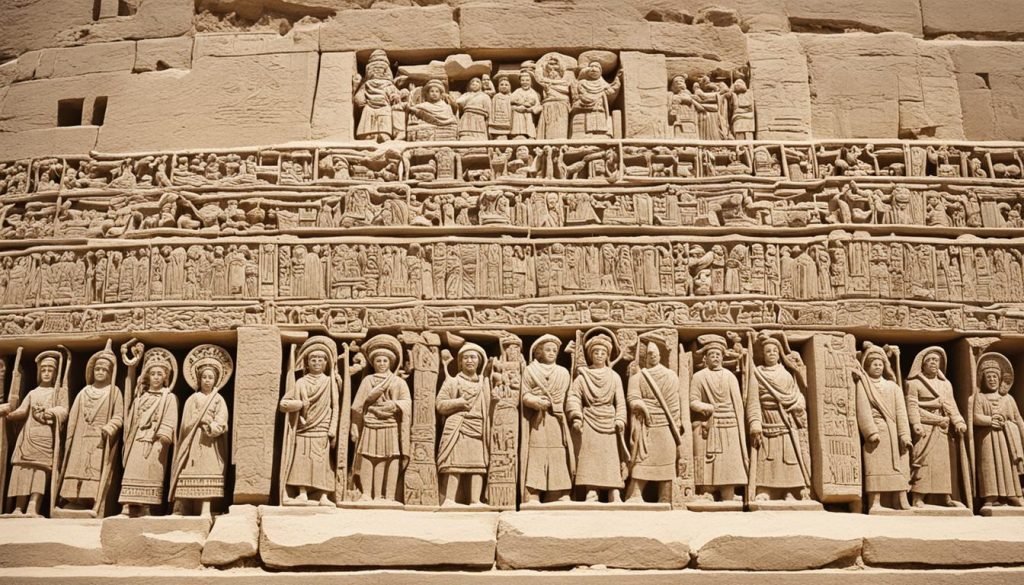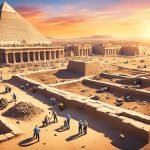In our world, many important stories are hidden away, often forgotten over time. Finding these lost histories is key to understanding our past. It lets us explore the forgotten stories that have shaped our lives today.
These stories give us deep insights into who we are and how we’ve changed. They show us that history is more than just a list of events. It’s a complex mix of human experiences that make us who we are.
When we rediscover these stories, we see how they affect us today. We learn why it’s vital to keep these stories alive for the next generation. This helps us connect with our past and understand our place in the world.
Key Takeaways
- Uncovering lost histories enriches our understanding of cultural identity.
- Forgotten stories rediscovered highlight the significance of past experiences.
- Historical rediscovery influences contemporary societal values.
- Preserving lost narratives is crucial for future generations.
- Engaging with our past fosters a deeper sense of community and belonging.
Exploring the Concept of Lost Histories
Historical rediscovery brings to light stories often left in the shadows. It shows us the power of history in understanding our shared past. By exploring these forgotten tales, we gain new insights and fill gaps left by traditional histories.
The Importance of Historical Rediscovery
Rediscovering history is key to valuing diverse voices and experiences. It helps us see past injustices and honor the resilience of marginalized groups. These efforts are crucial for a deeper understanding of how society has evolved.
How Forgotten Narratives Shape Our Understanding of the Past
Forgotten stories challenge our old views and widen our understanding of history. They reveal the struggles and victories of those often ignored. Projects and publications by communities show the power of these lost histories, connecting our past to our present.
| Aspects | Traditional Histories | Historical Rediscovery |
|---|---|---|
| Focus | Dominant narratives | Diverse perspectives |
| Method | Textual analysis | Archival and oral histories |
| Impact | Limited understanding | Enhanced cultural comprehension |
| Example | Traditional textbooks | Community storytelling projects |
By valuing these rediscoveries, we get a more inclusive and detailed view of the world. It’s a call for everyone to join in exploring these stories. It encourages us to look into the overlooked and celebrate the wide range of human experiences that shape our history.
Uncovering Lost Histories: Methods and Approaches
Uncovering lost histories takes many methods, like archival research and oral histories. These methods show us both written records and personal stories. They help us understand the past better.
Utilizing Archival Research for Historical Insights
Archival research is key in studying history. By looking at letters, photos, and official documents, researchers find important info. This info adds depth and context to stories of the past.
This approach lets historians see the real details of old events. It’s a way to get close to the truth of what happened.
The Role of Oral Histories in Reclaiming Narratives
Oral histories are vital, too. They tell us about people’s real lives and thoughts. These stories give us views that written records might miss.
By collecting these stories, researchers can fill in the blanks of history. They bring to light voices and stories that were left out before.

| Methodology | Description | Strengths |
|---|---|---|
| Archival Research | Investigation of primary source documents | Provides factual evidence, offers in-depth analysis |
| Oral Histories | Collection of personal narratives and experiences | Captures emotional nuances, highlights marginalized voices |
Marginalized Perspectives in Historical Rediscovery
Looking back at history with new eyes, we see the power of marginalized perspectives. These views bring to light stories we’ve never heard before. They show us the impact of groups that were left out. This makes history richer and pushes us to tell stories that include everyone.
Highlighting Untold Narratives of Underrepresented Groups
Women, indigenous peoples, and racial minorities often have their stories left untold or twisted in history books. By looking for these stories, we learn about big contributions that were ignored. This helps us honor these communities and question the stories that left them out.
Decolonizing History: A New Approach to Historical Narratives
Decolonizing history means rewriting the past to include more voices. It’s about seeing history from different cultures and fixing past wrongs. “Echoes of Ancient Civilizations” is an example of this change, showing us the value of diverse stories. By focusing on these stories, we get a fuller picture of history and learn to appreciate its complexity.
| Underrepresented Groups | Examples of Contributions | Historical Significance |
|---|---|---|
| Women | Key roles in social movements | Shaped modern rights and equality |
| Indigenous Peoples | Traditional ecological knowledge | Influenced sustainable practices |
| Racial Minorities | Artistic and cultural innovations | Enriched American cultural landscape |
Case Studies: Rediscovering Forgotten Legacies
Rediscovering lost histories is often done through community efforts focused on preserving culture. These projects highlight unique local traditions and share stories that last through time. They show how we can work together to bring back forgotten stories.
Community Projects Focused on Cultural Preservation
Many communities have started projects to keep their history alive. These efforts are key to preserving culture. Here are some examples:
- Neighborhood Heritage Festivals: These are yearly events that celebrate local traditions, music, and food.
- Historical Landmarks Restoration: Groups work together to fix up and honor important historical sites.
- Oral History Projects: People share their stories, creating written records and archives of their experiences.
Impactful Stories of Individuals Who Reshaped Their Communities
Many people have made a big impact by preserving culture. Their stories show how personal histories connect with the community’s story. Here are a few examples:
- The work of Ruth Simmons: As the first African American president of an Ivy League university, Simmons has inspired many with her work on educational fairness and cultural inclusion.
- Community activist Dolores Huerta: A co-founder of the United Farm Workers, Huerta fought hard for workers’ rights, making sure their voices were heard.
- The efforts of local historians: People like Robert Putnam have spent their careers studying and teaching the importance of community heritage.

| Project Type | Description | Impact |
|---|---|---|
| Heritage Festivals | Celebrations showcasing local culture and history. | Strengthens community bonds and raises awareness. |
| Landmarks Restoration | Efforts to renovate and recognize significant historical sites. | Preserves physical spaces that hold cultural significance. |
| Oral History Projects | Compilation of stories from community members. | Creates a rich archive of diverse experiences. |
These initiatives and stories show the importance of preserving culture. By celebrating and keeping local heritage alive, we inspire future generations with impactful stories.
Conclusion
Uncovering lost histories shows us how important stories from the past are. These stories help us understand what happened before. They also shape who we are today and how we see the world.
By rediscovering these tales, we can heal and learn more about ourselves. Communities that explore their forgotten pasts build stronger bonds with their heritage. This helps us talk more openly about who we are.
It’s crucial to keep looking into our past as we move forward. Every story adds to the rich history we share. By sharing these stories, we help others and build a society that values all its histories.
FAQ
What is the significance of uncovering lost histories?
How can forgotten narratives fill gaps in our cultural understanding?
What methodologies are used in historical rediscovery?
Why is it important to include marginalized perspectives in history?
What are some examples of successful community projects focused on cultural preservation?
How can individuals contribute to the process of reclaiming lost narratives?
Source Links
- https://southsideweekly.com/lifting-as-they-climbed-uncovering-forgotten-histories-mariame-kaba-essence-mcdowell/
- https://www.barnesandnoble.com/w/echoes-of-ancient-civilizations-rediscovering-lost-histories-and-technologies-viruti-shivan/1145256288
- https://www.historiamag.com/some-reasons-why-history-gets-lost/


